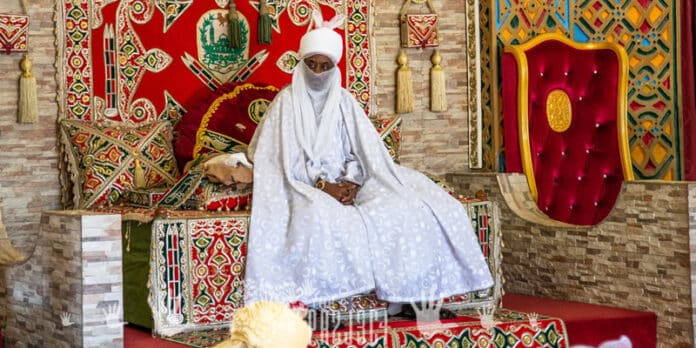Sanusi Lamido Sanusi, the former GM of United Bank of Africa, the former MD of First Bank, the former governor of the Central Bank, and the former Emir of Kano must by now be accustomed to the word ‘former’. In September 2021, he proved he wasn’t a fan of the word.
During a Kaduna Investment Summit, Muhammad Sani Abdullahi, Governor Nasir El-Rufai’s chief of staff since 2019, introduced Sanusi as the former emir of Kano.
“When I listened to the chief of staff… I will call him the former chief of staff. You will understand why I call you ‘former’ later,” Sanusi said when he took the microphone at the event.
“Next time, don’t call me ‘former Emir’. There is nothing like that.”
A few days later, the governor did a cabinet reshuffling. Abdullahi was removed from his position as chief of staff. He was deployed to the ministry of budget and planning.
It’s unclear whether Abdullahi’s removal as chief of staff was instigated by Sanusi, a good friend of El-Rufai. But a proverb in Yoruba says, Aje ke lana, omo ku leni; tani o mo pe aje to ke lana lo pa omo?
The English translation (which is less rhythmic) is: a witch cried yesterday, a child dies today; who doesn’t know that the witch that cried yesterday killed the child?
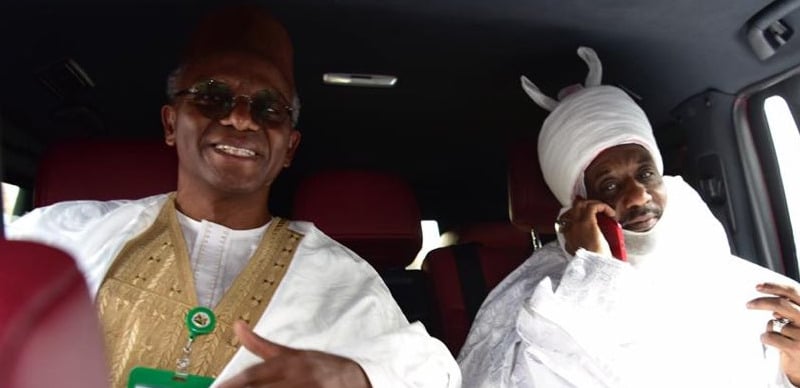
We present Sanusi Lamido Sanusi’s biography.
Related: Tony Elumelu Biography: Philanthropy, Net worth, Cowboy banker
Sanusi Lamido Sanusi: Birth
Sanusi Lamido Aminu Sanusi was born in Kano State on July 31st, 1961. He’s from the Sullubawa clan of the Torodbe Fulani. Sanusi grew up in the royal palace of his granduncle. As a youth, he received both religious and secular education.
Who is Sanusi Lamido Sanusi’s Father?
His father was Muhammad Lamido Sanusi, a career diplomat. He was once the Nigerian Ambassador to Belgium, China and Canada. Sanusi Sr. later served as the Permanent Secretary of the Federal Ministry of Foreign Affairs.
Sanusi Lamido Sanusi’s grandfather was Sir Muhammadu Sanusi, the 11th Fulani Emir of Kano, from 1953 to 1963. His cousin, Sir Ahmadu Bello, deposed him.
See this: Aliko Dangote Biography: Net worth, Serial Monogamist, Influence, AGIP
Sanusi Lamido Sanusi: Education
Sanusi attended his primary school at St. Anne’s Catholic Primary School, Kakuri, Kaduna State, between 1967 and 1972. He then went to King’s College, Lagos, for his secondary school education. That was between 1973 and 1977.
In 1977, he was admitted to Ahmadu Bello University in Zaria, Kaduna. He finished with a degree in Economics in 1981. Sanusi did his national youth service (NYSC) in Gongola State (now Taraba and Adamawa) after graduating from ABU.
He then enrolled for his master’s degree in Developmental Economics at the same university. Sanusi completed his MSc in 1983 with a distinction in Monetary Policy. Between 1983 and 1985, he was a lecturer of economics at ABU.
In 1991, Sanusi was off to the International University of Africa, Khartoum, Sudan to further his education. There, he got a second bachelor’s degree this time in Shariah and Islamic Studies in 1997.
He became fluent in Arabic and it aided his studying of the Quran’s law (Fiqh) and philosophy (Falsafah), amongst others. He read the works of prominent Western thinkers and Islamic authorities like Al-Kindi, Muhammad ibn-Zakariya al-Razi, Al-Farabi, Abu Yaqub al-Sijistani.
Sanusi was also exposed to the four Sunni madhhabs of Hanafi, Maliki, Shafi’i and Hanbali.
Related: Goodluck Ebele Jonathan Biography: Career, Children, Net worth, Scandals and More
Sanusi Lamido Sanusi’s Banking Career
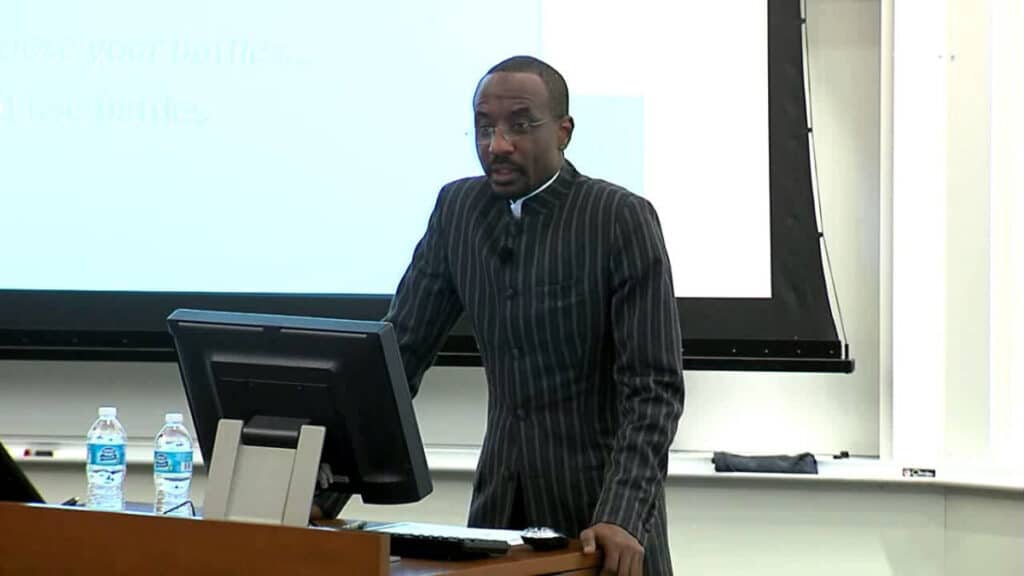
His sojourn in the banking industry started in 1985 when he joined Icon Limited, a merchant bank. The bank is a subsidiary of Morgan Guaranty Trust Bank of New York and the Baring Brothers of London.
The seven years he spent there saw him garner experience in various fields. Like financial advisory services, issuing house activities, privatization, debt conversion, credit and marketing. He rose to become the Area Manager of the Kano Area Office. He tendered his resignation to further his education in Sudan.
When he came back to Nigeria, he joined the newly privatized United Bank of Africa (UBA) Plc. He got the position of Principal Manager II in the Credit Risk Management Division. He became General Manager before leaving for First Bank of Nigeria as an Executive Director (Risk and Management Control) in September 2005.
In January 2009, Sanusi became the first person from northern Nigeria to be appointed as the bank’s Group Managing Director/Chief Executive Officer since the bank’s establishment in 1894 (as Bank of British West Africa). He was also the chairperson of the Kakawa Discount House and was on the Board of the First Bank of Nigeria (UK) Limited.
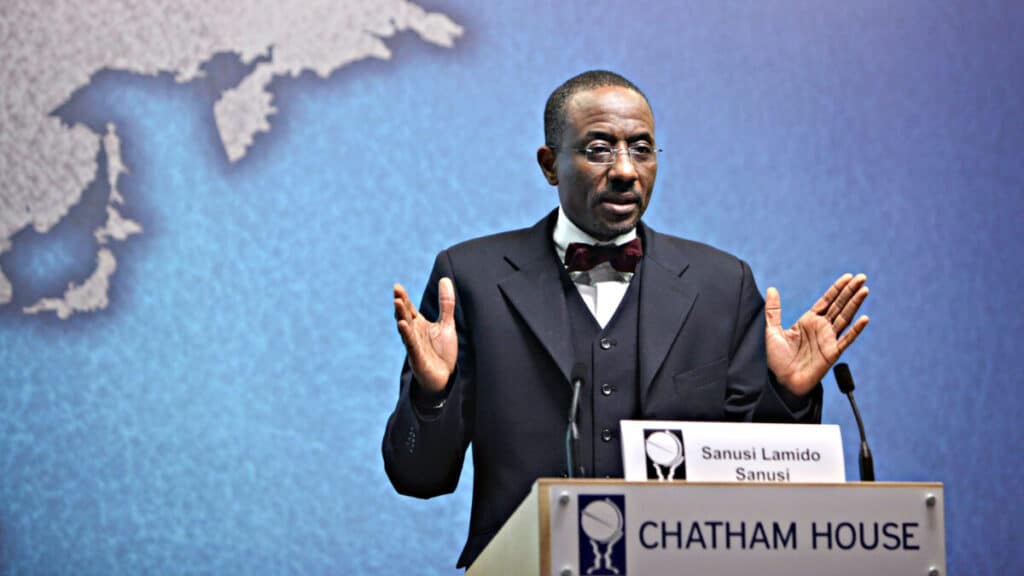
On June 1st 2009, President Umaru Musa Yar’Adua nominated him for the position of governor of the Central Bank of Nigeria. The Nigerian Senate confirmed his nomination two days after grilling him for three hours. Eight days after his nomination, Sanusi was appointed the 10th Governor of the Central Bank of Nigeria by Yar’Adua.
His appointment came when the nation was caught in the middle of a lingering global economic crisis. It was worsened by a sharp drop in oil prices. The Yar’Adua administration came out with a Seven-Point Agenda to stem the tide. But Sanusi had barely settled in at the Marble House of the apex body than picking holes in the rubric.
“Let us stop having a vision; let us start moving,” he said.
“The Seven Point Agenda of the government is critical. But I think these can be tackled in phases, with the most critical. Infrastructure, power, and food security are taking preference for now. If we could just focus on two or three things and finish them up. In the next four years, we will be far more effective in contributing to this country than focusing on seven.”
He showed he was a man with a focus. On August 14th 2009, he sacked the managing directors and the boards of five banks. It was over the allegation of granting non-performing loans to certain individuals and corporate organizations without adequate collateral.
The affected banks were Intercontinental Bank, Oceanic Bank, Afribank, FinBank, and Union Bank. The second phase of the reform saw the sacking of the MDs and board members of Bank PHB, Spring Bank, and Equitorial Trust Bank.
“We had to move in to send a powerful signal that such recklessness by bank executives will no longer be tolerated,” Sanusi said.
After their dismissal, 16 senior bank officials were dragged before the courts. Charges of fraud and the manipulation of share prices in collusion with unethical stockbrokers were levelled against them.
However, there were allegations that a plot by Sanusi to redraw the map of the banking industry was behind the move against the managing directors and boards of the eight banks. The Independent Shareholders Association of Nigeria frowned against the action, which rankled the banking sector.
“CBN, as the bank of last resort, was highly dishonourable in its approach to the nation’s banking ills. As it can bridge the liquidity gaps and work in harmony with banks towards recovering the bad loans,” a statement read in parts.
The Sanusi reform created an unprecedented credit squeeze in the economy as banks recalled credit from customers and shut the door on new credit lines. It negatively affected the economy. One of these was the crash in the capital market.
This prompted the Federal Executive Council (FEC) to approve an infusion of $2 billion from the foreign reserves to ease the crunch. Sanusi attributed the crash in the capital markets to “financial illiteracy by Nigerian investors”.
Sanusi started several extensive banking reforms termed the “Sanusi Tsunami”. The reforms were built around four pillars: enhancing the quality of banks, establishing financial stability, enabling healthy financial sector evolution, and ensuring the financial sector contributes to the real economy.
He introduced a consolidation process which reduced the number of banks in Nigeria. Through mergers and acquisitions, the banks became fewer, stronger and more accountable to depositors. Sanusi led efforts to increase the level of investment in infrastructure and support for small and medium enterprises.
A cashless policy is now a buzzword in Nigeria. But do you know it was Sanusi that developed the process whereby financial transactions were not conducted with paper money but through transferring digital information between the transacting parties?
The Muslim governor of CBN introduced and supported the establishment of Islamic banking in Nigeria. This move was criticized by the Christian Association of Nigeria, who were particularly irked with the word Islamic. If they had done their research, they would have found that it denotes interest-free banking.
The National Assembly was the next to criticize the head of the CBN, and it had nothing to do with Islam. The Assembly’s broad oversight function is to scrutinize bills and the conduct of government officials. But when Sanusi raised dust over its budgetary spending of 25 per cent of all government revenue, the watchdogs became the barking ones. Ironic.
There was no contrast between expectation and reality when Sanusi became Public Enemy Number One among Nigerians. The CBN governor became one when he advised Goodluck Jonathan’s administration on the removal of the fuel subsidy.
He said subsidies engendered a culture of high-level corruption and economic inefficiency. The mooted elimination of the subsidy turned unpopular and caused the Occupy Nigeria movement. The people called for Sanusi’s head. Sorry, resignation.
Jonathan was not Herod Antipas, but he eventually granted the people’s wish by ‘beheading’ Sanusi! It was unrelated to his call for subsidy removal, though. In December 2013, a letter the CBN governor Sanusi wrote to President Goodluck Jonathan was leaked to the public.
The letter revealed that the Nigerian National Petroleum Corporation (NNPC) failed to remit $48.9 billion of government oil revenue to the apex bank. When the heat was on, Sanusi blew the lid over another $20 billion missing from the nation’s coffers.
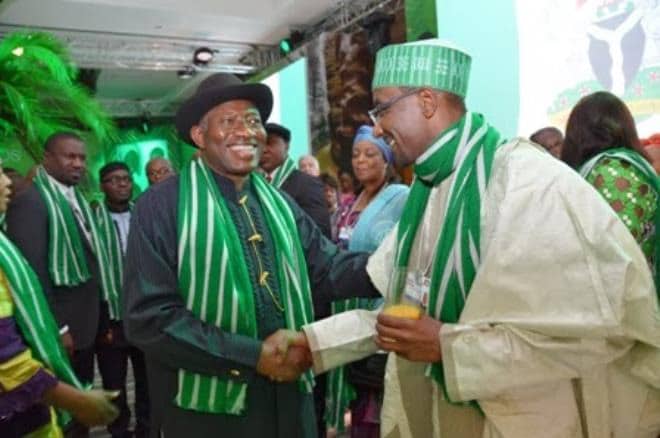
On February 20th 2014, while Sanusi was away in Niamey, Niger Republic on official assignment, the president suspended him from office. Two months later, he won a court case against the government after he was detained and his passport confiscated by the State Security Service.
The government later came out to defend the suspension of Sanusi. In a seven-page letter titled ‘Suspension from Office’, the Secretary to the Government of the Federation, SGF, Anyim Pius Anyim, traced Sanusi’s ordeal to the report of the Financial Reporting Council of Nigeria, FRCN, on the audited financial statement of the CBN for the year ended December 2012, and other related issues.
Sanusi’s suspension was predicated on the loss of confidence in his ability to lead the CBN to achieve its mandate, as enshrined in the CBN Act.
The government expressed concern that under Sanusi’s watch, the CBN had carried out its functions in a manner characterized by a disregard for due process and accountability, as exemplified by various acts of financial recklessness and unprofessional conduct.
However, Sanusi said there was nothing new about the allegations, saying his suspension was based on his concerns about oil revenues and corruption in the oil sector.
“I am not bothered about the suspension as an individual,” he said.
“I am proud of my achievements and legacies. If the suspension is going to bring back the missing $20 billion, then it is fine.”
Sanusi Lamido Sanusi: Emir of Kano
On June 6th 2014, Ado Bayero, who reigned as Emir of Kano between 1963 and 2014, died. Thereafter, a succession crisis loomed large among the royal family. Two days later, Sanusi, the holder of the traditional title of Dan Majen Kano (Son of Emir-Maje) was selected to succeed his granduncle, Ado Bayero.
He was crowned Sarki Muhammadu Sunusi II, the 57th monarch of the ancient city. By hierarchy, Sanusi turned into the fourth-most-critical Islamic conventional ruler in Nigeria after the Sultan of Sokoto, Shehu of Borno, and Emir of Gwandu.
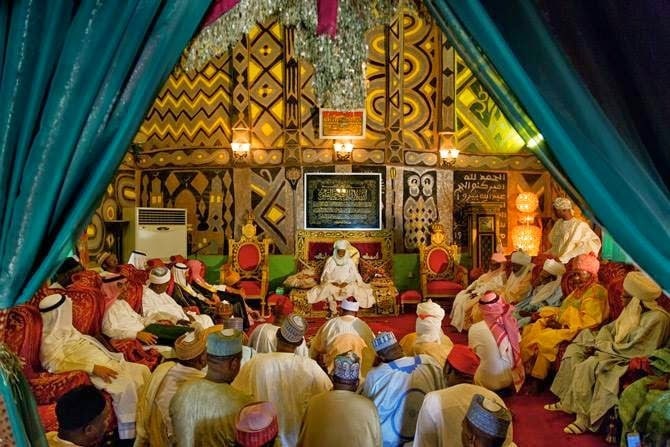
His accession led to protests from supporters of Sanusi Ado Bayero, the Chiroman Kano and son of the late Emir. His fans might not know the Biblical story that gave rise to the caption ‘the hand of Esau but the voice of Jacob’.
They are close to the truth, though, if they thought the governor of Kano State, Rabiu Kwankwaso, played a Rebecca and interfered with the king-making process.
During Sanusi’s six-year rule, he reinvented himself as a charismatic figure who could blend tradition and modernity.
“People have this idea of what an emir should be,” he said.
“He’s an older person. He’s quiet, he’s detached. I’m from a different generation.”
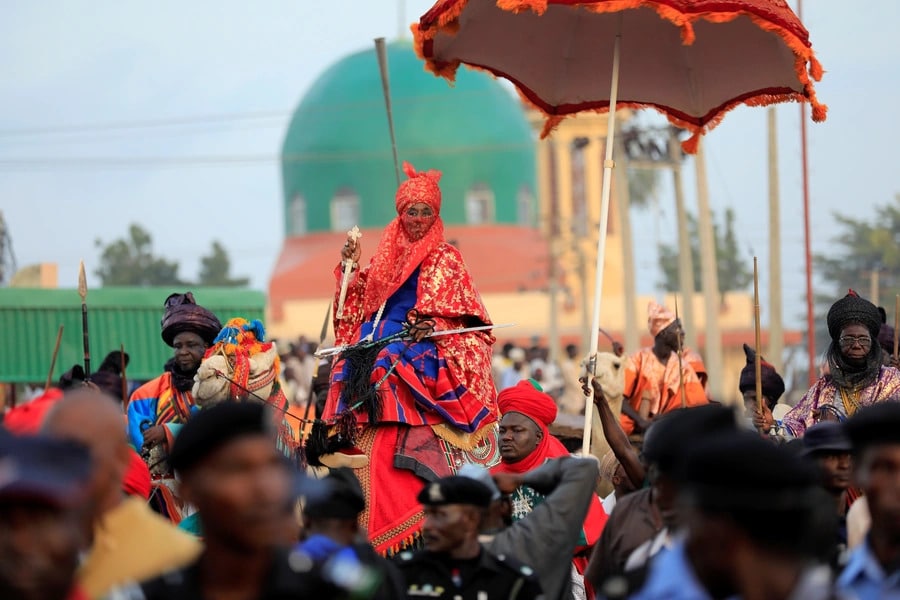
Sanusi proved to be different. Some of the major developments in his reign include the drafting of a new Islamic family law, the construction of a 40,000-book library, the promotion of the Durbar festival internationally, an increase in tourism to heritage sites such as the ancient Dalla Hill and Gidan Makama, revamping the ancient city’s cultural objects, etc.
Sanusi may be pretty combative and outspoken. Soon, he was at loggerheads with the new governor of Kano, Abdullahi Ganduje. Sanusi broke the royal tradition and spoke out about government policies. He felt some were misplaced priorities.
“We have governors; they go to China and spend one month on tour, and what do they come back with, MoU (Memorandum of Understanding) on debts,” he said.
“China will lend you $1.8bn to build light rail. This light rail will be done by rail workers from China. Trains will come from China. Engines will come from China. The labour comes from China. The driver is Chinese.
“At the end of the day, what do you benefit from it? Your citizen will ride on a train, and when you ride on a train, in northern Nigeria, in a state like Kano or Katsina, where are you going to? You’re not going to an industrial estate to work.
“You’re not going to school? You are not going to the farm. You borrow money from China to invest in trains so that your citizens can ride on them and go to weddings and naming ceremonies.”
The governor fought back. In 2017, the emirate council came under investigation for financial malpractices. Many analysts saw it as retribution for comments the Emir made against Ganduje’s administration. The state house of assembly later called off the investigation following intervention by the ruling class.
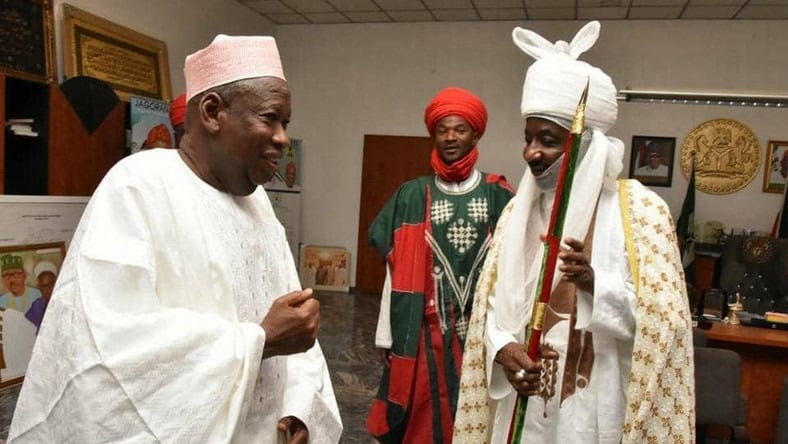
Not ready to sheath his sword, the governor signed into law the creation of four new emirates – Bichi, Rano, Gaya and Karaye – in 2019. According to the law, out of the 44 local government areas in the state, Sanusi, as Emir of Kano, will preside over only 10. The rest were under the new emirates.
Sanusi Lamido Sanusi’s Dethronement
On March 9th 2020, Sanusi was dethroned by the governor. The news got to him while he was in his private residence in Gidan Rumfa.
While he was waiting for state officials to serve him the deposition letter, a contingent of police, military, and security operatives stormed the palace. Sanusi was escorted out of the palace under heavy guard to a military air base. He was later informed of his exile from Kano to Nasarawa State.
“It is a thing of pride that made us rule and end in the same fashion as the Khalifa,” he said, regarding his grandfather Muhammadu Sanusi I, who was also deposed and exiled in 1963.
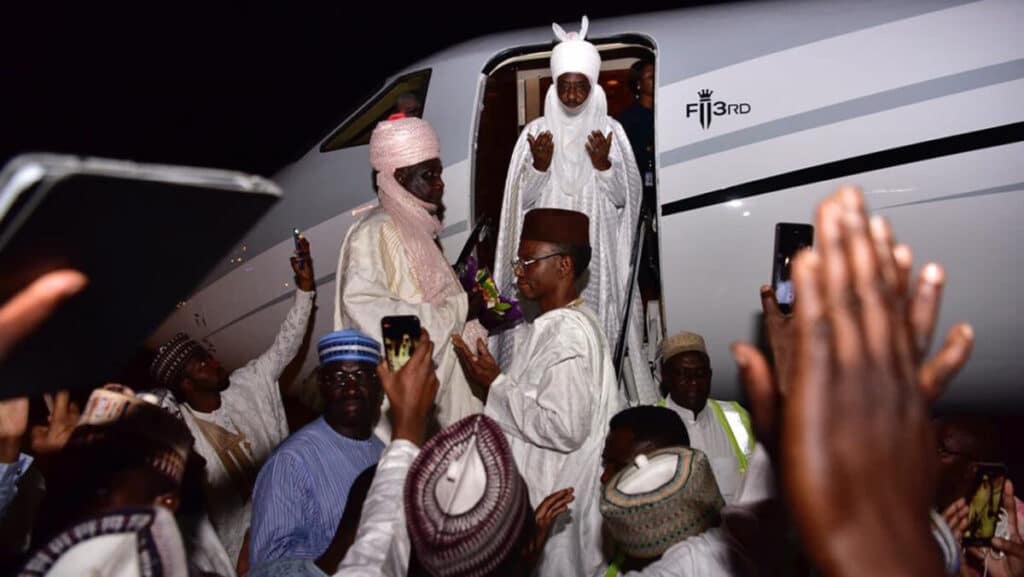
Sanusi Lamido Sanusi’s new appointment
On May 10th 2021, Sanusi was appointed as Khalifa (leader) of the Tijaniyyah Sufi order in Nigeria. This important position, which his grandfather once held, has a politico-spiritual authority over the second-largest Sufi order, with over 30 million adherents.
Sanusi is currently doing a PhD in Islamic Law at the University of London. He’s also a visiting scholar at the University of Oxford’s African Studies Centre.
His other engagements include advocating for United Nations Sustainable Development Goals; being the head of Babban Gona, a private agricultural initiative helping rural farmers; chairperson of Black Rhino, a Sub-Saharan Africa infrastructure fund of The Blackstone Group; chairperson of the Advisory Board of 1 Million Teachers, a non-governmental education organization; independent Non-Executive Director, MTN Group; vice chair of Kaduna Investment Promotion Agency, and Chancellor of the Kaduna State University.
But there’s one engagement he would never contemplate: the possibility of entry into politics.
“I cannot survive in Nigerian politics,” he said.
“Our duty as Muslims is to learn from the ideals of Prophet Muhammad to save the society from an imminent danger that is facing it.”
Sanusi Lamido Sanusi’s First Wife
Sanusi’s first wife is Hajia Sadiya, the daughter of his great uncle and the late Emir Ado Bayero and Hajia Maryam. Sanusi has three other wives. They are Rakiya Sanusi, Maryam Sanusi, and Sa’adatu Sanusi. He has 13 children with his four wives.
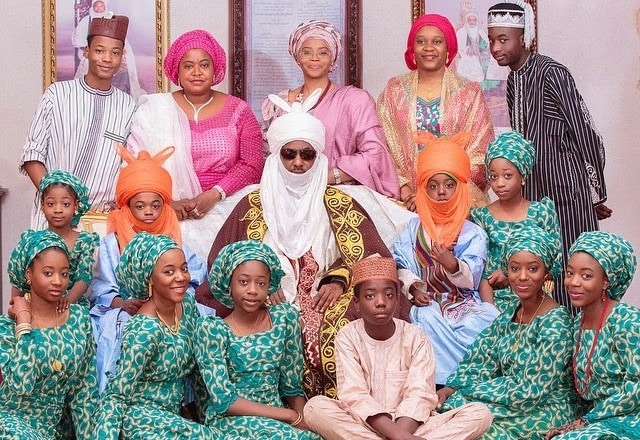
Sanusi Lamido Sanusi’s Honours
2009 – Vanguard, The Nation, and Leadership newspapers Man of the Year
2010 – Silverbird’s and Tribune Newspaper Man of the Year, and Sardauna Leadership Award, The Banker’s Central Bank Governor of the Year (worldwide) and Central Bank Governor of the Year for Africa
July 22nd 2010 – honoured with the Commander of the Order of the Niger (CON), the 4th highest national honour in Nigeria, by President Goodluck Jonathan
2011 – Listed as one of the TIME 100 Most Influential People in the World, African Leadership Person of the Year, and Forbes Africa Magazine Person of the Year
2013 – honoured at the third Global Islamic Finance Awards (GIFA) in Dubai for his advocacy in promoting Islamic banking and finance as the CBN governor
2015 – received the Global Leadership in Islamic Finance Award as the fifth GIFA Laureate
2018 – received an honorary doctorate from the Nile University of Nigeria
2019 – received an honorary doctorate from the SOAS University of London
Sanusi Lamido Sanusi’s Net worth
Sanusi’s estimated net worth is $80 million. He earned wealth from his banking career and enthronement as the Emir of Kano.
Sanusi Lamido Sanusi’s Cars
He owned a 1952 Rolls-Royce Silver Wraith, a Rolls-Royce Phantom VI, and a Rolls-Royce Phantom VII when he was the emir.
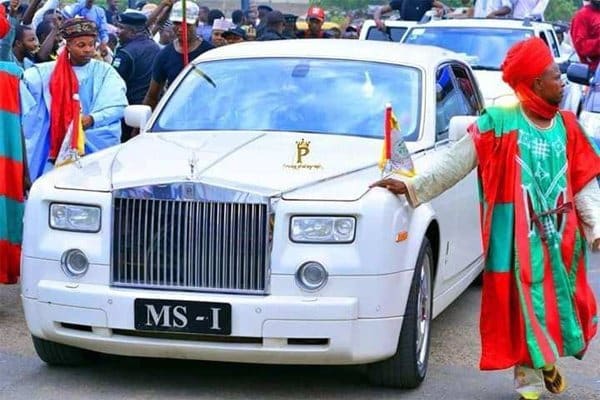
Controversies
Beheading of Akaluka
In 1995, Sanusi was alleged to have committed murder in Kano. After his return from Sudan, he was purported to have worked in tandem with some extremists to behead Gideon Akaluka, 22, an Igbo trader, for allegedly desecrating the Quran.
Sanusi and his cohorts stormed the prison where Akaluka was locked. He was dragged out. And beheaded. They later paraded his head around the streets of Kano.
The then head of state, General Sani Abacha, ordered the killing of the perpetrators of the crime. However, the elites in Kano were believed to have spared Sanusi. The future Emir was transferred to Sokoto prison from Kano, where he was alleged to have been incarcerated for two years.
Romance with a mother of four
In 2013, it was averred that Sanusi was romantically involved with one Maryam Yaro, a mother of four. The CBN governor was said to have appointed Maryam to the apex bank without following due processes. Sanusi not only got her a job but elevated her to the position of Assistant Director.
He denied the allegation, stating that the lady was never an employee of the CBN.
“I have known Dr Yaro since 1981. She was my student in Yola, and she later came to ABU Zaria. We have been best friends, but this is not why NIRSAL took her,” he said.
“You may wish to check her CV against all the other CVs in NIRSAL. And she went through an interview process with the NIRSAL CEO deciding not CBN HR. As for the personal allegations, this is all strange to me, but I have a personal policy of not responding to such allegations since, in Nigeria, anything can be published on any public officer without proof.”
Maryam Yaro, however declined comments when contacted.
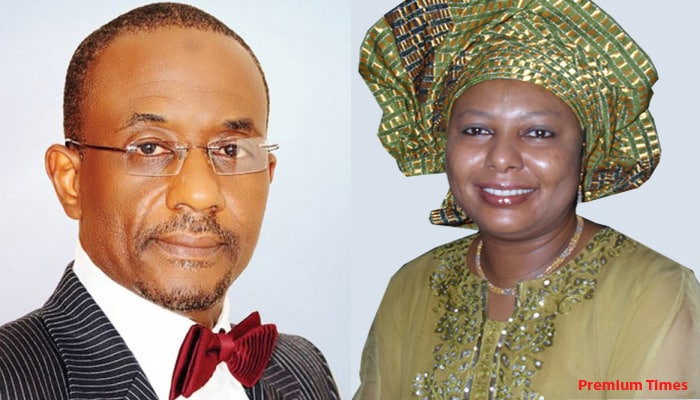
However, an official of the CBN spoke of how Sanusi had enthroned nepotism at the apex bank. He was accused of arbitrarily hiring his girlfriends and relatives and engaging in extramarital relationships with staff.
“This man (the CBN governor) is the most morally bankrupt governor the CBN has ever had,” the official said.
“Forget all the pretences. He is a shameless man of loose character.”
Multiple sources at both the CBN and First Bank describe the governor as an “incurable womanizer”.
“This guy seems unable to resist anything in a skirt, and it is unfortunate that a lot of young people look up to him as an example,” one of Sanusi’s aides said.
“It is sad that he wouldn’t even let married women be.”
An official of one of the country’s leading banks lent his voice to the Mr Macaroni-like topic.
“He is a fairly effective banker,” the official said.
“But he is a man of zero morality despite his public posturing. It is really sad.”
Marriage to an 18-year-old girl
In 2015, Sanusi faced public backlash after his alleged marriage to Sa’adatu Barkindo-Musdafa, the 18-year-old daughter of Muhammadu Barkindo-Musdafa, Lamido of Adamawa. He, however, released a statement to defend his actions. He stated that the girl in question was 18 and has attained the legal age of adulthood.
Conclusion
Sanusi Lamido Sanusi, the former GM of United Bank of Africa, the former MD of First Bank, the former governor of the Central Bank, and the former Emir of Kano must by now be accustomed to the word ‘former’.
But when you meet him, call him ‘His Excellency’!



